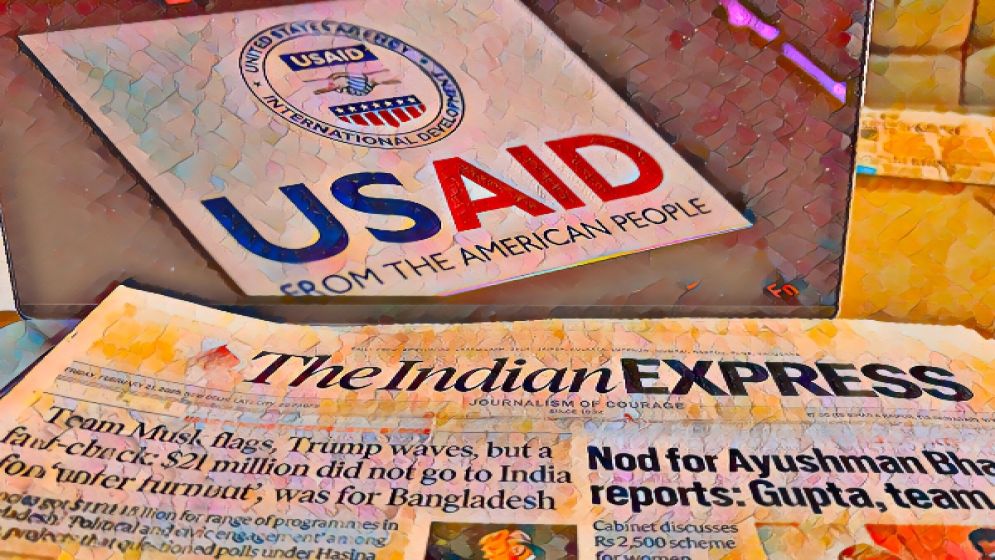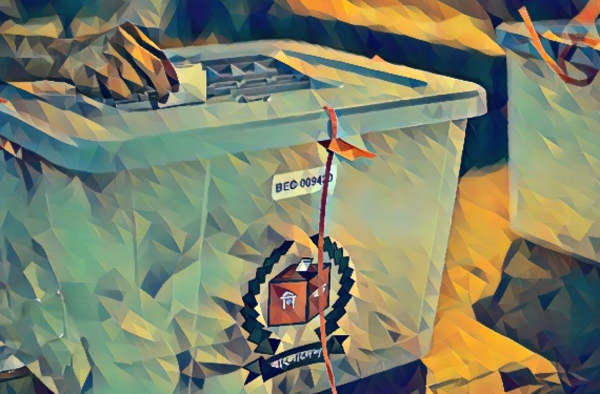Indian Express Exclusive: USAID allocates $21 million for "Voter Turnout" program in Bangladesh's last election

On Friday, while nearly all Indian media outlets ran front-page reports covering U.S. President Donald J. Trump's surprised reaction to USAID’s allocation of $21 million for “voter turnout” in the Indian elections, one newspaper made a striking revelation.
The Indian Express ran an exclusive investigative piece that cast doubt on the claimed destination of the funds.
Citing official federal spending records, investigative journalist Jay Mazoomdaar reported that the $21 million in question, which had been initially attributed to a voter turnout initiative for India, was actually earmarked for Bangladesh.
This revelation came just days after the Trump administration's Department of Government Efficiency (DOGE) announced the cancellation of several international aid programs through the U.S. Agency for International Development (USAID).
The agency, responsible for overseeing U.S. foreign aid, had been under scrutiny after Trump’s January 24 decision to freeze funds for a 90-day review.
The freeze particularly impacted $486 million in grants to the Consortium for Elections and Political Process Strengthening (CEPPS), a coalition of three organizations—the National Democratic Institute, the International Republican Institute, and The International Foundation for Electoral Systems—that work on elections and political transitions globally.
Among the programs canceled was an alleged $21 million grant for "voter turnout" in India.
On Wednesday, President Trump expressed his belief that the previous administration had tried to influence India’s elections by allegedly providing $21 million for "voter turnout."
“What do we need to spend $21 million on voter turnout in India?” Trump asked at a Miami event. “I guess they were trying to get somebody else elected.”
However, the DOGE, led by Trump senior adviser and billionaire Elon Musk, did not provide further details on which Indian entity or organization was meant to receive the funds.

Funds meant for Bangladesh
The Indian Express’s investigation, based on official U.S. federal expenditure data, meanwhile uncovered a crucial detail: the U.S. government has not funded any CEPPS projects in India since 2008.
Every U.S. federal grant must be linked to a specific “place of performance”—the country where the funds are intended to be used.
According to the newspaper, the grant in question, amounting to $21 million and designated for voter turnout, was instead allocated to a project in Bangladesh called Amar Vote Amar (My Vote is Mine).
Approved in July 2022, this grant was part of a three-year initiative, running until July 2025, designed to encourage political participation and civic engagement in Bangladesh.
According to The Indian Express, $13.4 million of the $21 million USAID grant has already been disbursed, allegedly for “political and civic engagement” initiatives aimed at students in Bangladesh, in the lead-up to the January 2024 general elections, as well as other related programs.
Sheikh Hasina, who resigned as Bangladesh’s prime minister in August after 16 years in power and fled to India, was re-elected during the January 2024 polls. However, the United States condemned the elections as “not free and fair.”
Hasina's ousting followed weeks of widespread, student-led protests against her Awami League government.
In November 2022, the purpose of the USAID funding was officially shifted to what became known as the “Nagorik (Citizen) Program,” The Indian Express reported.
The grant was later confirmed by a Dhaka-based USAID political processes adviser in a social media post from December 2024, in which he identified the $21 million CEPPS/Nagorik project as part of his responsibilities.
However, when The Indian Express reached out for comments, the International Foundation for Electoral Systems declined to respond, and inquiries sent to the National Democratic Institute and the International Republican Institute went unanswered.
The Indian Express also referenced social media posts from the Micro Governance Research program at the University of Dhaka, along with statements by its director, Associate Professor Aynul Islam, detailing how the funds had been utilized.
According to one post, 544 youth events were organized in Bangladeshi universities since September 2022 to “promote youth democratic leadership and civic engagement.”
These initiatives reportedly reached 10,264 university students through 221 action projects and 170 democracy sessions, among other activities.
Islam informed the newspaper that USAID had funneled the grants to the Nagorik program through CEPPS.
—

